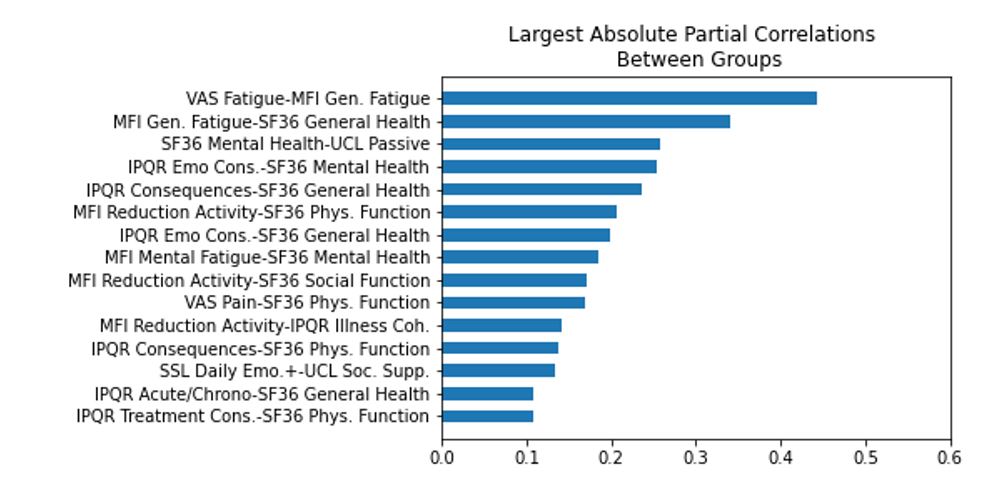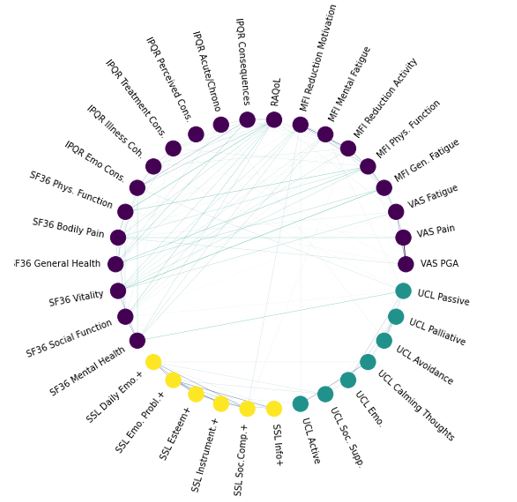Session Information
Date: Sunday, November 7, 2021
Title: Patient Outcomes, Preferences, & Attitudes Poster II: Measurements (0739–0763)
Session Type: Poster Session B
Session Time: 8:30AM-10:30AM
Background/Purpose: Current EULAR-guidelines recommend treating Rheumatoid Arthritis (RA) early, intensively and to-target. Patient-Reported Outcomes (PROs) can be important contributors for remote monitoring of disease status in patients with (early) RA to guide the interventions needed. However, which PROs are vital for such purposes is unknown. Therefore, we aimed to investigate the direct and indirect relations between different PROs in the Care in Early RA (CareRA) trial.
Methods: In CareRA, patients were asked to register the following PROs at baseline (BL), week 52 (W52), and week 104 (W104): Multi-Dimensional Fatigue Index (MF), Short Form 36 (SF36), Illness perception questionnaire (IPQ), Utrecht Coping List (UCL), Social Support List (SSL), Pittsburgh Sleep Questionnaire (PSQ), RA Quality of Life (RAQOL) and global health, pain and fatigue as measured by Visual Analogue Scale (VAS). Most questionnaires consist of different subdomains or subscores. Where applicable, these subscores were used, else the total score per questionnaire was used. The graphical lasso (GLASSO) method was used to estimate relations between PRO (sub)scores. GLASSO provides both an overview on indirect relations (via correlation) and on direct relations (via precision matrix). The GLASSO was run at BL, W52 and W104 to check for consistency over time.
Results: The GLASSO procedure suggested 168 direct relations out of 561 possible relations (±30%) at W104. Similar results were obtained at BL and W52. Fig 1 shows the 15 relations with the highest partial correlations between subscores from different PROs at W104. Absolute values of relationship strength showed slight variations, but the correlation scores appeared robust over time. Analyzed (sub)scores and relations estimated at W104 are presented in Fig 1. Three distinct groups of PROs were clearly identifiable from the GLASSO procedure. A first group consisting only of SSL subscores, a second group consisted only of UCL subscores and the last group consisted of all other PROs. There were many connections within each group and few between groups. This suggests that each group relates to a different underlying dimension.
Conclusion: Using the GLASSO-approach, we distinguished three distinct groups of PRO dimensions. Coping and social support constructs seem distinct from another heterogeneous group representing both mental and physical health topics. Correlation between these disease-activity-related PROs suggests not all PROs are required to get a representative view of patient health.
To cite this abstract in AMA style:
De Cock D, Verhavert G, Pazmino S, Bertrand D, Doumen M, Westhovens R, Verschueren P. The Patient as Assessor of Disease Status: A Graphical Evaluation of Relations Between Patient-Reported Outcomes in Early Rheumatoid Arthritis [abstract]. Arthritis Rheumatol. 2021; 73 (suppl 9). https://acrabstracts.org/abstract/the-patient-as-assessor-of-disease-status-a-graphical-evaluation-of-relations-between-patient-reported-outcomes-in-early-rheumatoid-arthritis/. Accessed .« Back to ACR Convergence 2021
ACR Meeting Abstracts - https://acrabstracts.org/abstract/the-patient-as-assessor-of-disease-status-a-graphical-evaluation-of-relations-between-patient-reported-outcomes-in-early-rheumatoid-arthritis/


